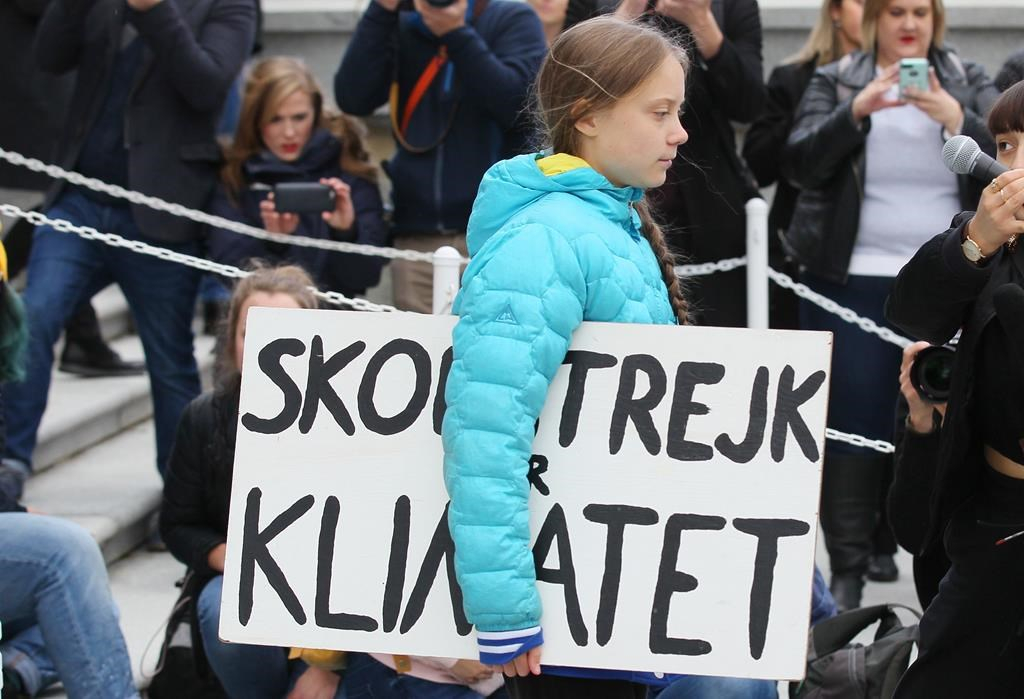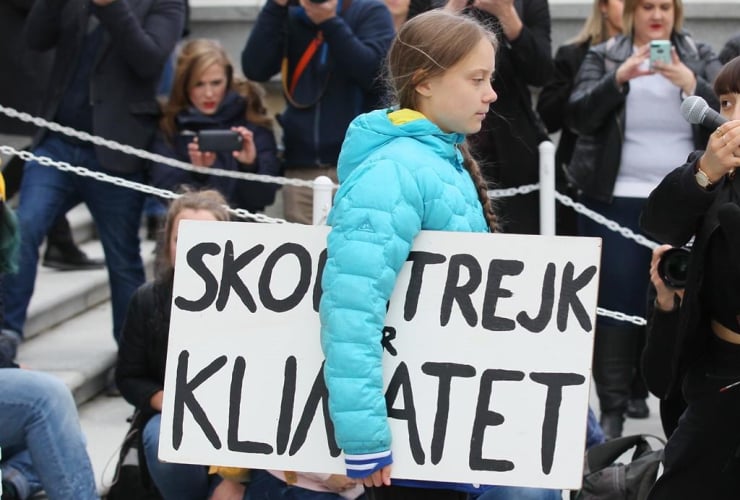Amnesty International says it's not enough for political leaders to condemn a sexually suggestive decal appearing to show teenage climate campaigner Greta Thunberg and they should do more to protect human rights activists.
The secretary general of the group's Canadian arm mentioned the sticker in a letter to Prime Minister Justin Trudeau and all premiers ahead of this week's first ministers meeting in Ottawa.
"While there have been many expressions of dismay and disgust about this particular sticker ... it is imperative to recognize and acknowledge that this is not a unique or singular incident," Alex Neve wrote in the letter dated March 5.
"It is reflective of a wider concern for which much more serious and concerted action is urgently needed."
Amnesty gave Thunberg and the Fridays for Future youth climate movement the Ambassador of Conscience Award, its top honour, last year.
Amnesty wants political leaders to commit to ensuring "human rights defenders" — particularly women and Indigenous people working on issues related to land, territory and the environment — are able to do their jobs free from threats and violence.
The sticker stirred global outrage when an image of it began circulating online last month. It had a black-and-white drawing of a female figure's bare back with hands pulling on her braided pigtails. The name "Greta" was written below. The logo of Alberta company X-Site Energy Services was under the drawing.
The RCMP called the decal distasteful, but not criminal. X-Site has said its management takes full responsibility and has promised to do better.
Alberta's minister for the status of women, Leela Aheer, called the graphic "completely deplorable, unacceptable and degrading" and Premier Jason Kenney called it "odious." Members of the House of Commons also panned the image.
"We're saying that's not enough. And it's particularly not enough given that this is reflective of what we feel is a deepening and growing pattern," Neve said in an interview Wednesday.
"It's not just about one high-profile globally celebrated human rights defender."
Neve said abuses of female and Indigenous environmental activists are a growing problem throughout the Americas. He's not suggesting, however, that what's happening in Canada is at all as severe as abuses in places such as Colombia or Brazil.
"It's in the hands of politicians to set the tone, to set the leadership and make sure that we change the channel on how we're talking about human rights defenders in Canada."
Neve sent another letter to Kenney in September flagging human rights concerns about the government's inquiry into the funding of environmental groups and its "war room" challenging oil and gas industry critics. In it, he urged Alberta to hold industry players accountable for their human rights responsibilities.
"This is an important opportunity to do so," Neve wrote in the most recent letter.
He said he wants the Alberta government to further investigate how the sticker was approved, made and circulated. And he wants all other governments to "adopt appropriate measures to end and prevent further threats and smear campaigns."
When asked Wednesday about Neve's latest letter, Kenney's spokeswoman Christine Myatt said: "The premier and other members of the government denounced the sticker at the time.
"The government is preoccupied with the coronavirus pandemic and related economic consequences for our province."
Neve admitted his letter is unlikely to be on the agenda at the first ministers meeting.
"Nonetheless, we wrote hopeful that bringing it to their attention would at least have an impact on building their awareness."
This report by The Canadian Press was first published on March 11, 2020
Most of what Amnesty
Most of what Amnesty International stands against is the universal human practice of "bullying" in it's ever expanding cosmos. It is so pervasive that vast segments of humanity would be silenced, disappeared, incarcerated were this "head hacking" meme of human communication to be outlawed. Well, at least 95% of humanity wouldn't be able to communicate in any fashion at all. Just consider the instances of "snark" in these few lines I've typed.
.
Satire, irony, taking the mickey, poking "fun" at, teasing, "can't you take a joke?" have probably existed for as long as has human communication. No doubt there's a gene for it. No doubt that removing it would take most of the life, the spice, the colour, out of the gift of language.
Isn't it a pity, human evolution always seems to reward the least admirable aspects of our adaptation?
Perhaps we have hit "peak" ugliness in the human character?
I wonder how long it will take humanity to de-volve into the soupy mass of toxic goo it is heading towards?




Comments